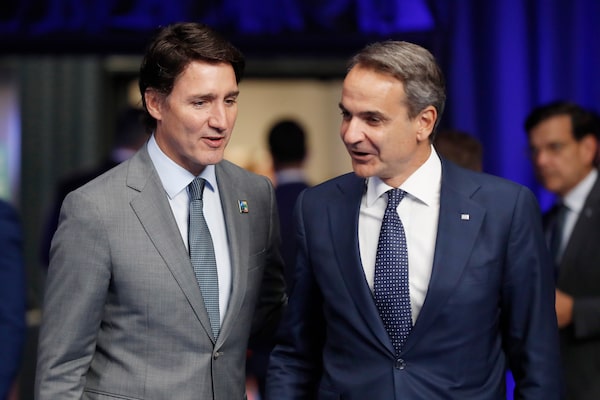
Prime Minister Justin Trudeau, left, speaks with Greek Prime Minister Kyriakos Mitsotakis during a round table meeting of the North Atlantic Council during a NATO summit in Vilnius, Lithuania, on July 11, 2023.Mindaugas Kulbis/The Associated Press
Theo Argitis is managing director at Compass Rose Group and former Ottawa bureau chief at Bloomberg News.
In the realm of international diplomacy, every visit by a world leader carries some weight and significance.
But the visit by Greek Prime Minister Kyriakos Mitsotakis to Canada this weekend stands out as a particular milestone.
It’s been four decades since a Greek prime minister has visited Canada. This is a surprisingly long diplomatic lapse for two countries that share deep ties.
And it’s no coincidence that the visit is happening now.
Canada has quietly become an important investor in Greece at a time when the European country is trying hard to shore up its credibility as an investment destination.
For Canadians lamenting our diminished role in the world, the Greek prime minister’s visit illustrates that we still have economic influence to yield.
Over the past few years, Canada has emerged as one the world’s largest creditor nations, supported by a combination of strong resource earnings and aggressive foreign investment by our financial sector hungry for better returns outside of the country.
Assets held abroad by Canadians totalled over $9-trillion at the end of last year, which is triple what it was a decade ago. That includes about $4-trillion in direct investment assets.
The amount of influence that Canada can exercise with all this cash shouldn’t be underestimated, especially amid the emerging debate over whether the federal government should pressure our pension funds to invest more at home.
The Greeks have certainly noticed Canada is asset-rich.
Reguly: Greek PM to announce purchase of Canadian-built water bombers during official visit
Just last month, a fully owned subsidiary of Canada’s biggest public sector worker pension fund – PSP Investments – spent about $430-million to acquire another 10-per-cent stake in the Athens International Airport, one of Greece’s largest companies by market value.
The acquisition brought PSP’s indirect holding in the airport to just over 50 per cent.
Fairfax Financial Holdings, a major Canadian investment firm run by famed money manager Prem Watsa, has been active in Greece for a decade with significant stakes in banking, insurance and property.
The total value of Canada’s investments in Greece are now on par with that of the United States and Italy, according to data from Enterprise Greece, an investment promotion agency.
Mr. Mitsotakis, who is speaking to a business audience in Toronto on Monday, will be encouraging Canadian investors to do more of the same.
This is what soft economic power looks like. Since the war in Afghanistan, it’s actually been the only type of power we’ve been able to project at all globally.
In the immediate aftermath of the global financial crisis in 2008 and 2009, Canada had an incredibly disproportionate influence on global policy thanks to a financial system that escaped the worst of the crisis.
As global policy makers scrambled to find answers at the time, it was no accident that Canada was the third country – after the U.S. and Britain – to host a G20 leaders summit.
Canada also scored critical positions in other G20 institutions, including placing then Bank of Canada governor Mark Carney in charge of reforming the global financial system.
This influence paid immediate dividends for Canada. Most significantly, prime minister Stephen Harper was successful in quashing a push for a new global bank tax
Canada’s clout has waned since then, but these growing sums of investments abroad offer some scope to reinvigorate our value to our global partners.
Canada has plenty of economic and political objectives to pursue with Europe, such as sustaining support for Ukraine and preventing Canadian resource exports from being hampered by any new EU environmental regulations.
Deepening investment ties with Europe is clearly in the national interest. Foreign direct investment creates virtuous economic cycles that only foster further business linkages, cement political ties and build goodwill that nations can leverage to further their own goals.
Just ask the Greeks.
The country has spent the better part of the past five decades trying to integrate economically with the major western European countries, in large part to bolster its own security in a part of the Mediterranean with always-present dangers. There’s a reason why Greece has the third highest level of defence spending as a share of GDP in NATO.
Greece has long understood national interests are closely linked to how and with whom it forges economic ties.
Mr. Mitsotakis’s visit shows that Canada may still matter more than it knows.